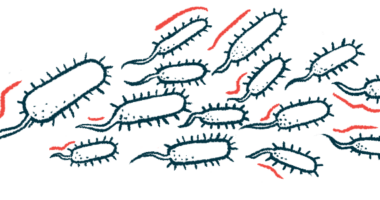Enrollment Begins in Clinical Trial of Bacteriophages for CF Infections
The study aims to test WRAIR-PAM-CF1 on adults with CF, positive for P. aeruginosa

A Phase 1b/2 clinical trial testing WRAIR-PAM-CF1, Adaptive Phage’s experimental cocktail of bacteriophages, or viruses that selectively target and kill bacteria, is now recruiting cystic fibrosis (CF) patients with chronic Pseudomonas aeruginosa infections.
The study (NCT05453578) seeks to enroll up to 72 adults with CF who test positive for P. aeruginosa — a common hard-to-treat bacteria infecting the lungs of CF patients — in the past year and at the screening visit. Recruitment is currently underway at Case Western Reserve University, in Ohio. A dozen more sites across the U.S. are expected to open in the future.
A feature of CF is the production of an abnormally thick and sticky mucus that builds up in certain organs of the body.
In the lungs, this mucus can block the airways and make it hard to breathe. It also increases susceptibility to respiratory infections, with the most common being those caused by the opportunistic bacterium P. aeruginosa, which is highly resistant to antibiotics.
“The prevalence of antibiotic resistance is concerning, and the need for more effective therapeutics for vulnerable populations, such as people with cystic fibrosis, is especially urgent,” Anthony S. Fauci, MD, said in a press release from the National Institutes of Health (NIH).
Fauci directs the National Institute of Allergy and Infectious Diseases, an arm of NIH that’s funding the study, which is being conducted by the Antibacterial Resistance Leadership Group.
To get around antibiotic resistance, researchers have been exploring new ways to fight off disease-causing bacteria.
Bacteriophages, sometimes called phages, are naturally occurring viruses that usually target only one particular species of bacteria. Once the bacteriophages get into the bacteria, they hijack their machinery to prevent them from making more bacteria and instead force them to make bacteriophages, which ends up killing the bacteria.
Because they spare not just human cells but also good bacteria that help keep the body healthy, bacteriophages represent a potential way to treat bacterial infections, especially those that have become resistant to antibiotics.
WRAIR-PAM-CF1 contains a cocktail of four species of bacteriophages that naturally infect and kill P. aeruginosa. Extensive lab studies revealed these bacteriophages are highly specific and don’t target human cells.
Genetic testing also showed these viruses don’t carry harmful genes that could transfer into the bacteria they target, such as those that could confer antibiotic resistance, according to the NIH.
Testing bacteriophage safety and effectiveness
The two-part Phase 1b/2 trial will test whether WRAIR-PAM-CF1 is safe and able to reduce the number of P. aeruginosa in the lungs of people with CF. It’s being conducted by the Antibacterial Resistance Leadership Group, a team of more than 100 experts working to fight the problem of antibacterial resistance.
Its first Phase 1b part will enroll six patients who will receive a single into-the-vein infusion of WRAIR-PAM-CF1 at one of three dose levels (two patients per dose level). At this stage, patients will know treatment they are receiving and will be monitored closely for four days. If no serious side effects occur, the study will move on to Phase 2 and up to 66 additional patients will be recruited.
The first 32 additional participants will be randomly assigned to receive a single infusion of either one of the three doses of WRAIR-PAM-CF1 or a placebo (eight patients each). Safety and efficacy data from an interim analysis one month after the infusion will help determine the optimal dose to be tested in a larger number of patients.
An additional 34 patients will be enrolled and randomly assigned to receive either the optimal dose of WRAIR-PAM-CF1 (17 patients) or a placebo (17 patients).
At the end of Phase 2, wherein neither the patients nor the researchers will know who is receiving which treatment, 25 participants will have received the optimal WRAIR-PAM-CF1 dose and 25 a placebo.
“Although research on bacteriophage therapy may still be in its infancy in the United States, we hope that this study, and others like it, could open the doors to a new type of therapy for difficult-to-treat bacterial infections,” Fauci said.








